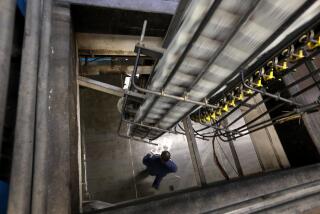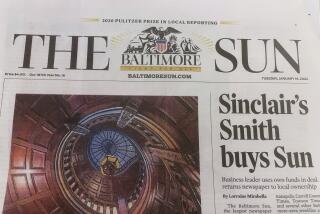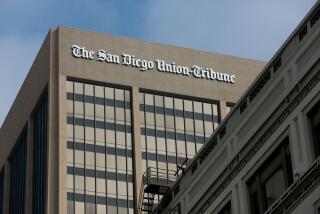Newspaper’s sale fails to stir Windy City
CHICAGO — Competition among this town’s daily newspapers used to be so intense that they would hijack a rival’s delivery trucks and dump the contents into the Chicago River.
Chicago journalism inspired Broadway’s “The Front Page” and produced icons such as Mike Royko. Reporters knew they had arrived when their bylines were laminated and posted over the bar at the Billy Goat Tavern. The local legends of journalism are immortalized there: the curmudgeons and columnists, the men -- and the occasional woman -- who struck fear into the City Hall machine and told of life in the Windy City.
But that was years ago. Many of those names are yellowed and faded now. Some have been forgotten.
Which is why this city of big shoulders greeted this week’s news of Tribune Co.’s sale of its media assets with a shrug.
“The media is no longer something people care about passionately in this town,” said Michael Miner, a media reporter for the Chicago Reader, an alternative weekly. “The sale of the Cubs? Huge news. The newspaper? To most people here, it’s a big ‘So what?’ ”
On Monday, Tribune announced that Sam Zell, a Chicago real estate magnate, would buy one of the nation’s largest public media companies. The $8.2-billion deal would give Zell control over the Chicago Tribune, the Los Angeles Times, cable TV network Superstation WGN and nearly 30 other TV stations, radio outlets and daily papers.
But as the sun warmed the city Monday and people here joined the morning rush-hour crush on Chicago’s elevated train, the chatter revolved around one thing: Tribune’s plans to sell the beloved -- and legendarily cursed -- Cubs after this baseball season.
Squeezed onto the blue line train in Oak Park, friends Drew Harrod and Derrick Godfrey spent their commute into the city quietly discussing the sale of a team that hasn’t won a World Series since 1908 and speculating about its future in its Wrigley Field shrine.
“I’m actually hopeful for the first time in years that the team’s luck could be turning,” said Harrod, 31, a department store salesperson.
But, 33-year-old Godfrey worried, what if the Tribune sold the team to someone outside Chicago? “What if it’s to someone worse than the Tribune?” he asked. “What if they move the team out of Wrigley?”
Harrod glared at Godfrey in horror. “No way. No way anyone’s insane enough to do that.”
Back in the 1920s and ‘30s, when at least 10 daily newspapers fought to grab readers’ attention, the talk would probably have been as much about the sale’s effect on the paper’s news coverage as about the team’s fate.
Editors scrambled to boost their readership during the “Front Page” era -- the play by Ben Hecht and Charles MacArthur about reporters who schemed and conned their way onto their newspapers’ Page 1.
During the 1970s, the Chicago Tribune and its rival, the Sun-Times, regularly raided each other’s newsroom staff. In the 1980s, after media baron Rupert Murdoch stepped into the ownership seat at the Sun-Times, the two papers waged a circulation war that included wooing readers with cash prizes and promotion freebies.
Over the decades, the Tribune tower has become a proud symbol of architecture and journalism. It still draws crowds of tourists and locals, who remain fascinated by the majesty of the gothic skyscraper and its quirky lore.
They clamor to find out tidbits from the past, such as when newspaper baron Col. Robert R. McCormick had a secret staircase built off of his 24th-floor office in the tower that led to a hidden refuge -- just in case he needed to flee from enemies who might storm the building. They snap photographs inside the tower’s ornate lobby, where the marble walls have famous quotes supporting free speech and 1st Amendment rights carved into them.
Yet in recent years, the public’s news habits shifted to the Internet and the traditional media industry consolidated. And the relationship readers have with their newspapers in Chicago and elsewhere changed.
“This is a town where people feel passion for things, and frankly no one’s passionate about the Tribune,” said Steve Rhodes, who runs the local media watchdog site Beachwood Reporter.com.
“They respect it. They respect the stories and the work the reporters do. But they’re not passionate about it. It doesn’t pull on people’s heartstrings the way the Cubs do.”
The push to sell the Tribune did make some locals nervous, particularly at a time when there has been a steady string of endings among the city’s revered icons.
Late last year, Marshall Field’s faded away when New York-based Macy’s took over the department store chain. The Berghoff restaurant, known for obtaining the city’s first post-Prohibition liquor license, closed up shop in 2005. So did City News Service, a scrappy outlet where author Kurt Vonnegut once worked.
Yet such closures come at a time when Chicago is booming, and the number of commercial and residential projects is on the rise. Just a decade ago, few people lived in the warehouse-heavy downtown streets of the South and West Loop. Now, thousands of young professionals, students and aging empty-nesters have moved into newly constructed high-rise condos, drawn by a burgeoning night life and easy access to the city’s expansive Millennium Park.
The city enjoyed a boost when Boeing Co. moved its headquarters from Seattle to Chicago in 2001, and again with the rise of the futures markets -- and the subsequent growth of the Chicago Mercantile Exchange and the Board of Trade.
To local business and city officials, the Zell deal came as a relief -- in no small part because the decision to stay with a local owner could help maintain a Midwestern corporate culture that has long been the media giant’s calling card.
“The Tribune is a historic corporate figure in this town, a part of Chicago’s rich history,” said Jerry Roper, president of the Chicagoland Chamber of Commerce, which covers a six-county region of northeastern Illinois. “To have a local owner, especially an entrepreneur, taking the helm is very appealing.”
Among those watching the sale the closest were Tribune employees themselves. At WGN Radio, Tribune’s news and talk station whose call letters came from its “World’s Greatest Newspaper” slogan, the staff spent much of Monday fielding calls from the public and reporting on details of the deal.
But interest in the sale quickly waned there too: By the 5 p.m. broadcast, about nine hours after the Tribune sale was announced, it was already old news. Something else was the top story.
More to Read
Sign up for Essential California
The most important California stories and recommendations in your inbox every morning.
You may occasionally receive promotional content from the Los Angeles Times.










